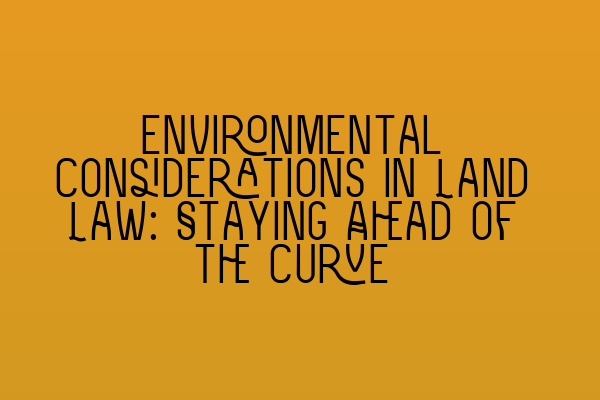Environmental Considerations in Land Law: Staying Ahead of the Curve
When it comes to land law, there are numerous factors that need to be taken into consideration. One such factor that has gained significant importance in recent years is the impact of environmental issues on property transactions. As our understanding of the environment grows, it becomes increasingly crucial for solicitors and property professionals to stay ahead of the curve and ensure that environmental considerations are properly addressed in land law matters.
With the threat of climate change looming large and increasing awareness about sustainability, there has been a paradigm shift in how we view land and its potential uses. It is no longer enough to focus solely on legal and financial aspects of property transactions; environmental factors must be carefully evaluated to mitigate risks and safeguard against any potential liabilities.
The Legal Landscape
Within the legal landscape, there are a number of regulations and legislation in place to address environmental concerns in land law. These include:
- Contaminated Land Statutory Guidance
- Flood Risk Assessments
- Environmental Impact Assessment for Planning Projects
- Waste Management Regulations
These regulations ensure that environmental risks associated with land are identified, assessed, and managed appropriately. It is imperative that solicitors and property professionals are familiar with these regulations and understand their implications in order to provide effective advice to their clients.
Due Diligence
As a solicitor or property professional, conducting thorough due diligence is key to identifying and understanding any potential environmental risks associated with a property. This includes:
- Obtaining environmental reports and surveys
- Reviewing planning permissions and restrictions
- Identifying potential contamination from hazardous substances
- Evaluating flood risk assessments
- Assessing the impact of nearby infrastructure projects
By meticulously examining these factors, solicitors can provide comprehensive advice to their clients and ensure that any potential risks are addressed and mitigated.
Environmental Impact Assessments (EIA)
One of the key tools in evaluating the potential environmental impact of a development project is an Environmental Impact Assessment (EIA). An EIA is a comprehensive study that assesses the environmental effects of a proposed development, taking into consideration factors such as air quality, water resources, biodiversity, noise levels, and waste management.
By conducting an EIA, solicitors can identify any potential environmental risks associated with a development and ensure that appropriate measures are in place to mitigate them. This not only helps protect the environment but also minimizes the risk of legal disputes and liabilities for the developer.
Thinking Ahead
In today’s rapidly changing world, it is essential for solicitors and property professionals to think ahead and anticipate future environmental considerations. By doing so, they can provide their clients with advice that takes into account the evolving regulatory landscape and potential long-term risks.
With climate change and sustainability becoming increasingly important, solicitors should consider factors such as renewable energy generation, carbon footprint reduction, and eco-friendly building practices when advising clients on property matters. By embracing sustainable practices and considering the environmental implications of their actions, solicitors can not only stay ahead of the curve but also contribute to the greater good of society.
Conclusion
Environmental considerations in land law are no longer optional; they are an integral part of property transactions. Solicitors and property professionals must equip themselves with the knowledge and understanding of environmental regulations and conduct thorough due diligence to identify and manage potential risks. By thinking ahead and embracing sustainable practices, they can effectively navigate the evolving legal landscape and provide their clients with robust and comprehensive advice.
Staying ahead of the curve in environmental considerations will not only benefit clients but also contribute to a more sustainable and environmentally responsible approach to land law.
For a comprehensive understanding of the skills assessed in the SQE exam, refer to article 39. Skills Assessed in SQE: Understanding the Exam Content. If you’re seeking strategies to balance work and SQE exam preparation, check out article 22. Balancing Work and SQE Prep: Strategies for Success. Unlock the secrets to passing the SQE exam by reading article 24. Unlocking the Secrets to Passing the SQE Exam. Understand the grading system in the SQE exam with the insights provided in article 23. Understanding the Grading System in SQE. Alternatively, enhance your knowledge with SQE webinars and gain expert insights by reading article 24. Unlocking Knowledge with SQE Webinars: Expert Insights at Your Fingertips.
